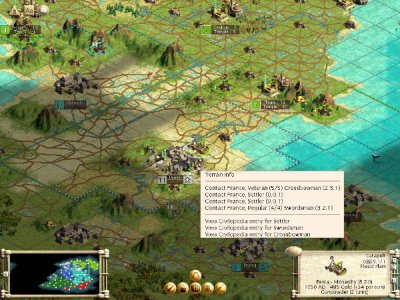Originally posted by Zouave
Wrong on all counts.
The South had a very good chance of winning (by surviving) in the Civil War, and if Sherman hadn't taken Atlanta when he did in 1864 Lincoln way very well have lost the election to peace candidate (and Southern sympathizer) McClellan.
Japan misjudged America's RESOLVE mostly; even so, if they had the same luck we did at the Battle of Midway in 1942 they may have been able to force the American fleet (what little was left of it) back to the American coast, and perhaps force a negotiated peace if the American casualties became to heavy.
Saddam had no choice but to leave his cannon fodder conscripts to receive the Allied attack. His best armor units also didn't know that the new American fire systems in the Abrams tanks totally outranged the best he had.
I am trying to think of any historical attack as stupid as the AI's attacks. . . in 6,000 years of history the only one I can come up with that is close is the Khmer Rouge of Cambodia attacking Vietnam in the 1970's. But the KR were demented genocidal fanatics. The reality is that the AI is stupider than most any historical civ.
Zoave, thanks for the comment. It's interesting to debate with someone who knows something about history.
As I said, I agree with you that the AI is too *consistently* stupid about declaring war and incompetent in tactics. Infogames/firaxis may have dumbed down the AI to keep players from getting unhappy about the difficulty. I think most of us would welcome more configuration options to control the AI's competence.
As far as the South winning the Civil War, maybe it was possible for the South to hold out. And my great-great-great grandfather fought for the South, was captured when they surrendered at Vicksburg, was released in a prisoner exchange, joined the Confederate Army again, and was captured a second time! Still, most people would agree it was a foolish war for the South to get into, for many reasons, including the ones I mentioned previously.
America also had extremely bad luck in the Pacific. There was a telegraph that somehow never arrived in time at Pearl Harbor. It would have notified Admiral Kimmel that the Japanese were about to attack. At Midway, the American torpedoes released prematurely from many of the torpedo bombers, but even so, the number of torpedo bombers sent at the Japanese carriers pulled the Japanese fighters too low to stop the dive bombers. Tolstoy speculated about cause and effect in history when writing about the battle of Borodino in War and Peace. The luck factor usually evens out over time. If the Japanese had lost only 1 or 2 carriers at Midway, the war might have lasted longer. But in that case, another Midway-style ambush surely would have happened somewhere else later on, because America had broken their code. Japan underestimated not only America's resolve, but also:
- The difference America's wealth and industry would make
- America's advantage in science, which would grow as the war progressed.
- I am probably omitting the "practical" side of American warmaking, which, unlike Japan, did not bet everything on a small, irreplaceable, elite group of naval pilots.
Yamamoto did not underestimate, and did not want a war with, America, for very good reasons.
"Saddam had no choice..." Yes he did. And if he didn't know about the Abrams tanks, why does the AI have to know how good your units are?
I think the most one-sided wars don't get as much historical coverage simply because they tend to be less interesting. But they occurred. For example, the little island Melos (Thucycides, the Pelopenesian War XVII) fought the vastly stronger Athenians with the result that their men were all killed and the women and children enslaved. And this chapter might never have been written, but Thucydides wanted a story to demonstrate a principle of "justice," which was, for the Athenians, "might makes right."


